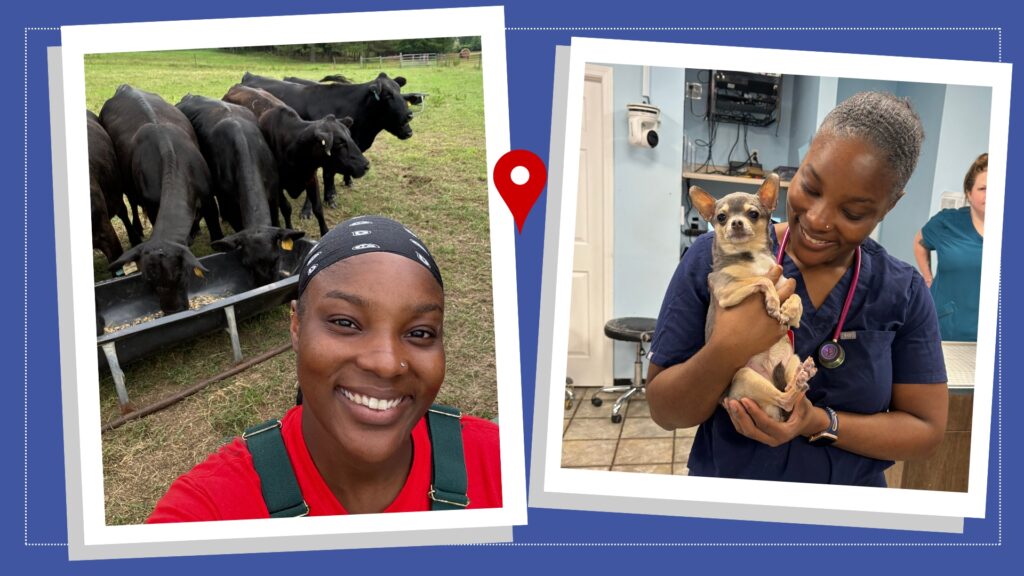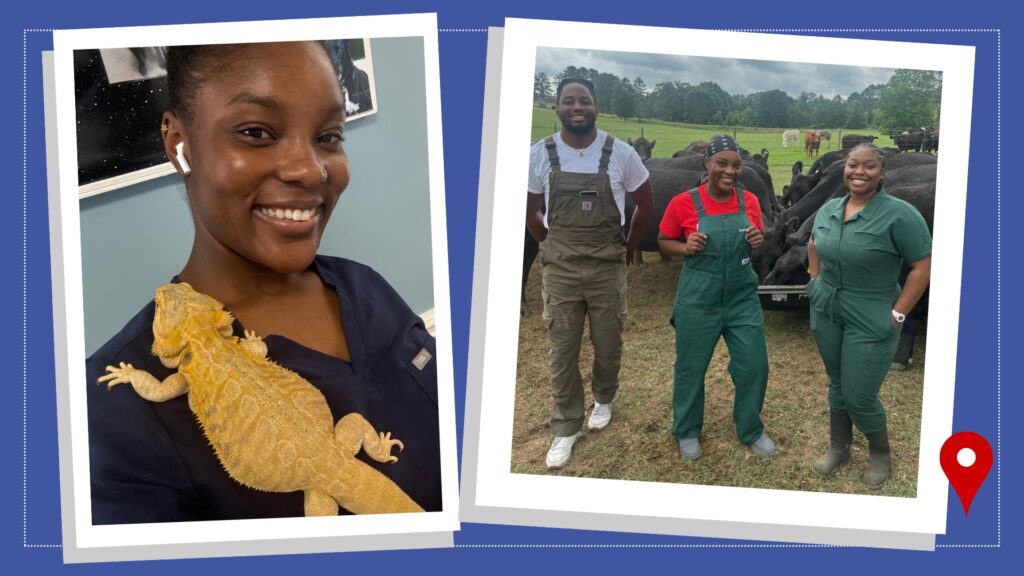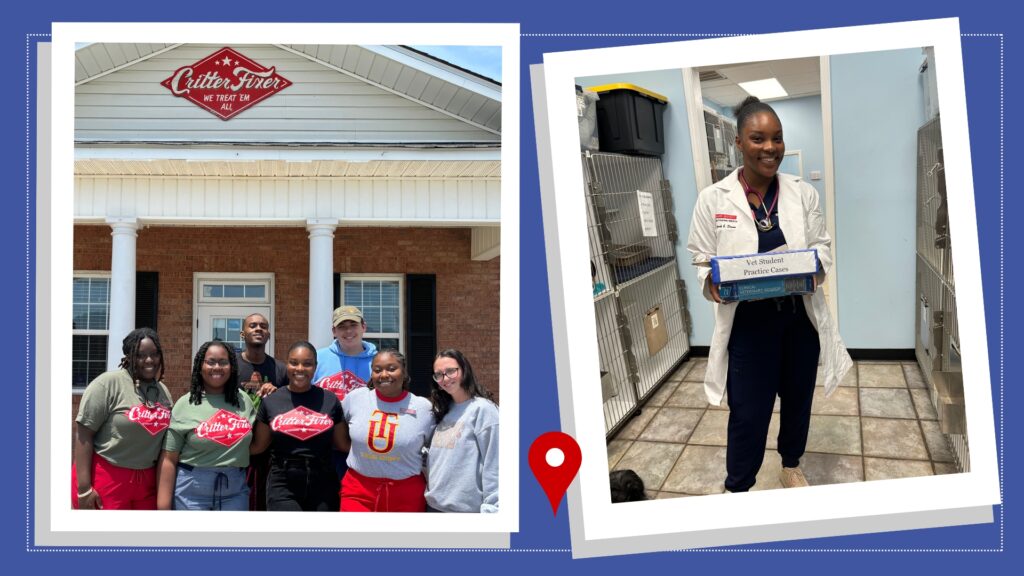From a North Carolina Veterinary Specialist Practice, Shafarah Dixon Reports
Students at the NC State College of Veterinary Medicine have access to all kinds of internships, externships and research experiences during their four years of school. This summer, several students are sharing some of what they're doing and learning in real time.

Stepping into the world of exotic animals through an externship with Carolina Veterinary Specialists Huntersville was a transformative experience. During my 5th block of my fourth year, I embarked on a journey where every moment was a revelation and every encounter a lesson.
From the minute I arrived, the air was filled with the sounds of creatures I had only read about in textbooks. The first day immersed me in the daily routines of care and animal restraint. I shadowed Dr. Lauren Powers and her team as they conducted health checks on various species including small mammals and birds. I was able to practice doing thorough physical exams, viral testing collection by swabbing birds on the eyes, beak and vent and anesthesia on birds going under for major surgeries. Each procedure was a blend of precision and compassion, reinforcing my respect for the delicate balance between caretaker and patient.
One memorable morning, I assisted in the treatment of a white bearded Manakin from Discovery Place in Charlotte, North Carolina. The meticulousness required to handle such a tiny bird left me in awe. Every touch was deliberate, every decision critical. It was in those moments of intense focus that I realized the profound responsibility of safeguarding these animals and their medical necessities. That morning, we gave an emergency dose of dextrose and warmed fluids under the skin, and Dr. Powers assisted- fed critical care to him.
The externship wasn’t just about clinical procedures; it was also about understanding the intricacies of exotics and how information has to be extrapolated from other species for treatment. It was also about knowing what zoonotic diseases domesticated small animals could transmit to humans. I participated in discussions about canine distemper viruses in ferrets and how to carefully work up emergencies in reptiles based on their metabolic needs.

One of the most impactful aspects of the externship was the opportunity to engage with the local learning facilities for animal care for a day. I was fortunate to accompany Dr. Gregory Lewbart, an NC State College of Veterinary Medicine professor, to Discovery Place in Charlotte, North Carolina. When we arrived, we got set up in the common treatment room and did annual physical exams on an iguana, an opossum, a couple of Burmese Star tortoises, a couple of white tree frogs and a yellow stingray. This was an experience unlike other experiences I’ve had. Some of the procedures I helped with were assist-feeding a white tree frog that presented to us for weight loss and not eating, safely restraining a yellow stingray while Dr. Lewbart collected a blood sample and holding Dido the opossum while she was being evaluated for a wound on her tail. I had never seen a blood draw done on an aquatic creature such as a yellow stingray and I was blown away by how far veterinary medicine has come. Whether I was observing the management of zoological species or engaging in providing active veterinary care, every interaction reinforced the importance of environmental awareness of zoological species. In teaching the public, we can preserve our planet’s biodiversity.
Beyond the clinical and educational aspects, the externship fostered personal growth. It taught me resilience in the face of challenges, whether it was adapting to unpredictable schedules or confronting the harsh realities of species decline. It also taught me not to be afraid of small animal restraint and administering medication on itty bitty creatures. I have always been concerned about doing more harm than good, by causing stress to a small animal with treatment. Every setback became a lesson in perseverance, a testament to the dedication required to effect meaningful change in the world of exotic medicine.

As I reflect on my externship with exotic animals, I am reminded of the privilege and responsibility that come with caring for these extraordinary creatures. It was a journey that transcended the confines of a veterinary clinic, immersing me in the interconnectedness of animal health, environmental stewardship and human advocacy. It reaffirmed my commitment to pursuing a career where compassion meets solidifying the human-animal bond, where each day brings new challenges and opportunities to make a difference.
My externship with Carolina Veterinary Specialists Exotics service was more than just a learning experience — it was a transformative journey that shaped my understanding of veterinary medicine and my role in knowing how to treat exotic animals with emergencies. It ignited a passion within me to advocate for those who cannot speak for themselves and inspired me to pursue a future dedicated to the well-being of exotic animals.
JUNE 13, 2024

Hi, my name is Shafarah Dixon. I am a fourth-year veterinary student who aspires to become an emergency veterinarian after graduating from NC State’s College of Veterinary Medicine.
I recently had the pleasure and honor of externing at Critter Fixer Veterinary Hospital in Bonaire, Georgia. The veterinarians there are featured in an ABC-TV show called Critter Fixers: Country Vets. They see an assortment of animals such as reptiles, cows, dogs, cats, birds and rodents. While I was there, I got the opportunity to handle cases, do surgical procedures and even do health checks on beef cattle.
My favorite part about this externship was that the team members at each location were very warm and inviting. I felt right at home the minute I walked through the door. I’m excited to share some photos of me loving up on patients and doing some procedures.


- Categories:


